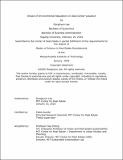Impact of Environmental Regulation on Data Center Valuation
Author(s)
Lee, Donghyun
DownloadThesis PDF (1.922Mb)
Advisor
Duarte, Fabio
Terms of use
Metadata
Show full item recordAbstract
Artificial intelligence has become one of the defining trends of modern society, with applications spanning virtually every industry. This societal shift has also influenced the real estate landscape. While data centers have existed for decades, it is only in recent years that they have garnered significant attention, demonstrated by their strong rent growth and compressed cap rates.1 Along with the attention over data centers, there also has been extensive research on how data centers impact the environment, such as "Quantifying the Sustainability Impact of Data Center Availability" by Manish Marwah et al. which present how data center power architecture may impact the environment and "The Environmental Footprint of Data Centers in the United States" by Md Abu Bakar Siddik, Arman Shehabi, and Landon Marsto. This research delves into quantifying the environmental impacts of data centers, specifically focusing on carbon and water footprints. However, what remains unexplored is how environmental regulations influence the valuation of data centers as a distinct real estate property type. This thesis examines how data center valuations could be impacted if existing environmental regulations were applied to regions where data centers are concentrated. The findings reveal a complex dynamic: while penalties under these regulations would reduce net operating income (NOI), potentially devaluing these assets, the same regulations would discourage new development, exacerbate the already constrained supply, and ultimately drive-up market rents for these properties. As a result, these opposing forces create ambiguity regarding the net impact of such regulations on data center valuations, with the outcome depending on which force prevails. What is clear, however, is that tenants would bear the brunt of these regulations, as landlords are likely to pass on increased costs through higher rents. On the other hand, while the environmental impacts of data centers and AI applications is critical to achieving sustainability goals, the societal benefits of AI solutions—ranging from advancements in healthcare to increased operational efficiencies—must also be considered. Balancing these competing priorities presents a unique challenge for policymakers and investors, with significant implications for the future of real estate and the digital economy.
Date issued
2025-02Department
Massachusetts Institute of Technology. Center for Real Estate. Program in Real Estate Development.Publisher
Massachusetts Institute of Technology